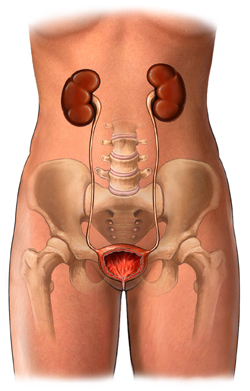Removal of the bladder – Radical cystectomy
Bladder Removal Description
Radical cystectomy – surgery to remove the bladder.
Reasons for removing the bladder
The reasons for cystectomy are:
- Bladder Cancer;
- Problems neuromuscular control of the bladder;
- Damage to the bladder from radiation or chemotherapy;
- Damage to the bladder from trauma.
Possible complications when removing the bladder
Complications occur in 25% -35% patients, undergoing cystectomy. If a cystectomy is planned, you need to know about possible complications, which may include:
- Infection;
- Bleeding;
- Loss of sexual function;
- Accumulation of fluid in the peritoneal cavity;
- Damage to internal organs;
- Blockage of the flow of urine from the ureter to the bladder;
- Nutritional Problems (depending on the intestinal segment, which is used to create a pathway for urine);
- Blood clots;
- Reaction to anesthesia;
- Urinary incontinence.
Previous abdominal surgeries, pelvis or radiation therapy in the area of the operation increase the risk of complications.
How is bladder removal surgery performed??
Preparation for the procedure
Stop smoking before surgery. You may also need to take antibiotics, to prevent infection, and laxatives, to cleanse the bowel.
At night before the operation, you can not eat anything and drink only clear liquids. After midnight and in the morning of the procedure, you cannot eat or drink anything, including coffee, tea and water.
- Sometimes, a week before the procedure, you must stop taking certain drugs:
- Aspirin or other anti-inflammatory drugs;
- Blood thinners, eg, clopidogrel (Plaviks) or warfarin (Kumadin).
Anesthesia
During the operation using general anesthesia. During the operation, the patient is asleep.
Description of the operation to remove the bladder
An incision is made on the abdomen, to access the bladder. All blood vessels, suitable for it will be cut off. Then the bladder will be removed. Together with the bladder, other tissues or organs can be removed as needed.
The doctor will also need to create a new pathway to drain urine.. A new bladder can be formed using a portion of the intestine or an external container, attached to the belly.

How long does it take to remove the bladder?
The operation may take from 1 to 5 hours.
Will it hurt when removing the bladder?
Anesthesia prevents pain during surgery. Soreness may be felt during recovery. Your doctor may prescribe pain relievers as needed.
The average hospital stay
Typically, the duration of stay of 5-12 days. The exact time will depend on the state of health and the reasons for the operation.. Your doctor may prolong hospitalization, If there are complications.
Care after surgery to remove the bladder
In the hospital
- It may be necessary to stay in an intensive care unit for 2-3 days;
- During the operation, special tubes are inserted through the nose into the abdomen. They will stay there for days. Since the patient will not be able to eat, food will be supplied through a dropper;
- If a urine collection container was installed during surgery, the patient is taught, how to use it.
At home
When you return home, you need to perform the following actions, to ensure the normal recovery:
- Strenuous activities should be avoided during 4-6 weeks;
- Lifting weights should be avoided, stress and sexual activity for a period of time;
- Driving and climbing stairs is usually allowed. You need to ask the doctor about the possible presence of any restrictions on this activity;
- We need to ask the doctor when it is safe to shower, bathe or expose the cut by water;
- Be sure to follow your doctor's instructions.
It is necessary to go to the hospital in the following cases
- There are signs of infection, including fever and chills;
- Redness, edema, increased pain, bleeding or discharge from the incision and / or stoma;
- Nausea and / or vomiting;
- Inability to relieve pain using painkillers;
- Inability to urinate or difficulty urinating, pomutnenye, presence of pus, bad smell of urine;
- Cough, shortness of breath or chest pain.
